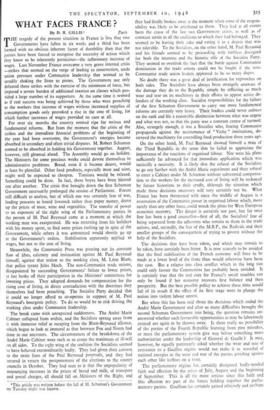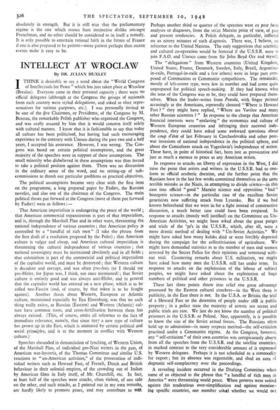WHAT FACES FRANCE ?
11 HE tragedy of the present situation in France is less that two Governments have fallen in six weeks and a third has been formed with no obvious inherent factor of durability than that the parties have been forced to recognise the necessity of action which they know to be inherently pernicious—the inflationary increase of wages. Last November France overcame a very grave internal crisis —strikes that seemed on the verge of leading to insurrection, trade union pressure under Communist leadership that seemed to be steadily shaking the State to pieces. The Government not only defeated these strikes with the exercise of the minimum of force, but imposed a severe burden of additional taxation on classes which pro- vided a large number of its supporters. At the same time it seemed as if real success was being achieved by those who were preaching to the workers that increase of wages without increased supplies of consumption goods only provoked a rise in the cost of living, for which further increases of wages provided no cure at all.
For over six months the country seemed ripe for serious and fundamental reforms. But from the moment that the crisis of the strikes and the immediate financial problems of the beginning of the year had been overcome, the Government's energies became absorbed in secondary and often trivial disputes. M. Robert Schuman seemed to be absorbed in holding his Government together. August, however, still gleamed ahead. The Assembly would go on holiday. The Ministers for some precious weeks could devote themselves to administrative problems. Bread, even if it became dearer, would at least be plentiful. Other food products, especially meat and wine, might well be expected to cheapen. Tensions would be relaxed. Something could, be done. In fact, these hopes have been blasted one after another. The crisis that brought down the first Schuman • Government necessarily prolonged the session of Parliament. Forces still difficult to analyse, but of which one was certainly fear of war, leading peasants to hoard livestock rather than paper money, drove up the prices of meat, wine and vegetables. The transfer of power to an exponent of the right wing of the Parliamentary parties in the person of M. Paul Reynaud came at a moment at which the working man was exasperated. He was returning from his holidays with his money spent, to find some prices rushing up in spite of the Government, while others it was announced would shortly go up at the Government's orders. Stabilisation apparently applied to wages, but not to the cost of living.
Meanwhile, the Communist Press was pouring out its constant flow of jibes, calumny and insinuation against M. Paul Reynaud himself, against that traitor to the working class, M. Leon Blum, that police tyrant Jules Moch. The non-Communist trade unions, disappointed by succeeding Governments' failure to lower prices, at last broke off their participation in the Ministers' committees for lowering prices. They adopted demands for compensation for the rising cost of living, in direct contradiction with the doctrines they themselves had been preaching. The Socialist Party decided that it could no longer afford to co-operate in support of M. Paul Reynaud's bourgeois policy. To do so would be to risk driving the working class under Communist leadership.
The break came with unexpected suddenness. The Andre Marie Cabinet collapsed from within, and the Socialists sprang away from it with immense relief at escaping from the Blum-Reynaud alliance, which began to look as immoral as that between Fox and North had done to our ancestors. The circumstances of the breakdown of the Andre Marie Cabinet were such as to create the maximum of on all sides. To the right wing of the coalition the Socialists seemed to have behaved extraordinarily badly. They had given their consent to the main lines of the Paul Reynaud proposals, and they had secured in return the postponement of the elections to the county councils in October. They had seen to it that the unpopularity of announcing increases in the prices of bread and milk, of transport and postal charges, all should fall on Ministers of the Right, and
*This article was written before the fall of M. Schuman's Government on Tuesday night was known. they had finally broken away at the moment when some of the respon- sibility was likely to be attributed to them. They had at all events been the cause of the last two Government crises, as well as of constant strain in all the coalitions to which they had belonged. They seemed to be having their cake and eating it to a degree that was not tolerable. To the Socialists, on the other hand, M. Paul Reynaud and his friends seemed to be proceeding with ruthless disregard for both the interests and the. historic role of the Socialist Party. They seemed to overlook the fact that the battle against Communist domination in the trade unions could not be fought if the non- Communist trade union leadeA appeared to be so many dupes.
No doubt there was a great deal of justification for reproaches on both sides. The Socialists have always been strangely unaware of the damage they do to the Republic simply by inflicting so much wear and tear on its machinery in their efforts to appear active de- fenders of the working class. Socialist responsibilities for the failure of the first Schuman Government to carry out more fundamental reforms are certainly very heavy. Their leaders could never enforce on the rank and file a reasonable distinction between what was urgent and what was not, so that the party was a constant centre of turmoil. Also, strangely enough, it was a Socialist who, fearing Communist propaganda against the maintenance of " Vichy " institutions, de- stroyed the machinery for controlling food production three years ago.
On the other hand, M. Paul Reynaud showed himself a man of the Third Republic in the sense that he failed to appreciate the importance of the reactions of organised labour. Nor were his plans sufficiently far advanced for that immediate application which was tactically a necessity. It is likely that the refusal of the Socialists to go any further with the Andre Marie experiment and their refusal to enter a Cabinet under M. Schuman without substantial compensa- tion to the workers for the increased cost of living will be reckoned by future historians to their credit, although the situation which made these decisions necessary will very certainly not be. What France has been threatened with since the middle of August is a restoration of the Communist power in organised labour which, more surely than any other force, could wreck the plans for West European economic recovery. The danger is certainly not past, but for once fear has been a good counsellor—first of all, the Socialists' fear of being separated from the adherents who remain to them in the trade unions, and, secondly, the fear of the M.R.P., the Radicals and their smaller groups of the consequences of trying to govern without the help of the Socialists.
The decisions that have been taken, and which may remain to be taken, have certainly been bitter. It is now scarcely to be avoided that the final stabilisation of the French economy will have to be made at a lower level of the franc than would otherwise have been the case. But a relapse into class conflict which in the long run could only favour the Communists has probably been avoided. It is certainly true that the real cure for. France's social troubles can only be found if her economy recovers first balance and then prosperity. But the best possible policy to achieve these aims would fail of its result if the effect of its first stage were to plunge the nation into violent labour unrest.
But when this has been said about the decisions which ended the Andre Marie Government and after so many difficulties brought the second Schuman Government into being, the question remains un- answered whether such favourable opportunities as may be laboriously created are again to be thrown away. Is there really no possibility of the parties of the Fourth Republic learning from past mistakes, or must the parliamentary system give way before something more authoritarian under the leadership of General de Gaulle ? It may, however, be equally pertinently asked whether the wear and tear of resistance to a Gaullist regime would not make it as wasteful of national energies as the wear and tear of the parties grinding against each other like icefloes on a river.
The parliamentary regime has certainly dissipated badly-needed faith and affection by the crises of July, August and the beginning of September. This is all the more serious since this faith and this affection are part of the forces holding together the parlia- mentary parties. Gaullism has certainly gained relatively and perhaps absolutely in strength. But it is still true that the parliamentary regime is the one which rouses least instinctive dislike amongst Frenchman, and no other should be considered as in itself a remedy. It is only possible to entertain rational faith in the future of France if one is also prepared to be patient—more patient perhaps than recent events make it easy to be.



































 Previous page
Previous page